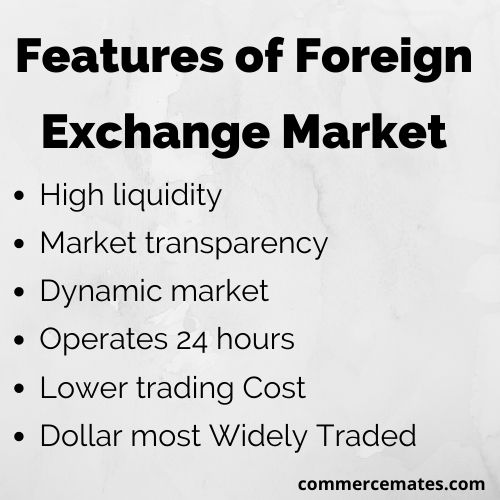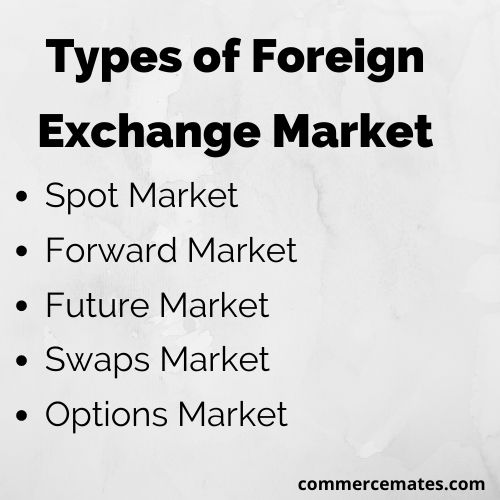Contents
What is Foreign Exchange Market?
Foreign exchange market is a market for buying and selling foreign currencies. It is a global online network where currencies of different countries are bought and sold. The foreign exchange market determines the exchange rate for currencies around the world. This market is also termed as Currency, FX, or forex market. Its structure comprises of individuals, firms, commercial banks, the central banks, importers and exporters, investors, brokers, immigrants, tourists. The foreign exchange market is a system and does not have any physical location.
This market operates 24 hours a day from 5 p.m. EST on Sunday to 4 p.m. EST on Friday. It is the world’s most liquid financial market. The trading of currencies in the foreign exchange market always takes place in pairs so that the value of one of the currencies in that pair is relative to the value of others. This global market has two tiers. The first one is known as the interbank market and the second one is known as the over-the-counter market.
The interbank market is the one where bigger banks trade and exchange currencies with each other. Over the counter market is the one where individuals and companies trade and has become a very popular market as now there are several companies that provide online trading platforms.
Features of Foreign Exchange Market
Features of the foreign exchange market can be well understood from the points given below:

High liquidity
The foreign exchange market is the most liquid financial market in the world. It involves the trading of various currencies across the globe. All traders in this market are free to buy or sell currencies anytime as per their choice. They are free to exchange currencies without prices of currencies being traded getting affected. Currencies prices remain the same both at the time of order placed and executed thereby enabling to earn the expected prices.
Market transparency
Trader in the foreign exchange market has full access to all market data and information. They can easily monitor different countries’ currencies price fluctuations through real-time portfolio and account tracking without the need of a broker. All this information helps in making better trading decisions and control over investments.
Dynamic market
The foreign exchange market is a dynamic market. In these markets, currency values change every second and hour. These values changes in accordance with changing forces of demand and supply which also helps in determining the exchange rates. Due to its fast-changing character, this market is termed as the perfect market to trade.
Operates 24 hours
Foreign exchange markets function 24 hours a day. It provides a platform where currencies can be traded anytime by traders. It provides a convenient time to all necessary adjustments when and wherever needed.
Lower trading Cost
The forex market has a very low trading cost. In these markets, there are no commissions like in case of any other investments. Any difference between buying and selling prices of currencies is the only cost of trading in the forex market. As there are low costs then the possibility of incurring losses is also minimum thereby making it possible for small investors to make good profit from trading.
Dollar most Widely Traded
The dollar is the most dominant currency in the foreign exchange market. This currency is paired with every country’s currency being traded in the forex market. In a major proportion of transactions every day, the dollar is one of the two currencies being traded.
Types of Foreign Exchange Market
Different types of Foreign exchange market are as follows:

Spot Market
The spot market is a market in which quick transactions regarding currency exchange takes place. Here buying and selling of currencies is done for immediate delivery. Immediate payment at the current exchange rate is provided to buyers and sellers in the spot market. The Trade-in spot market takes one or two days for settlement of transactions and allows traders to open to the volatility of the currency market. This can increase or decrease price, between agreement and trade. Spot market almost accounts for one-third of currency exchange transactions.
Forward Market
It is a market in which transactions are done for doing trade at some future date. Here both payment and delivery are done at future date at agreed exchange rate also termed as the forward exchange rate. The contract is made between buyers and sellers for sale and purchase of currency after 90 days. Forward contracts are non-standardized contracts. It means that these contracts can be customized or tailored according to the needs of participants. At the time of entering the contract, no security deposit is required as no money exchange takes place.
Future Market
Future market is also similar to the forward market. In future market, contract are made between buyers and sellers to do trade in future. All payments and delivery in this market are done at decided exchange rate which is also termed as future rate. Whereas future contracts are standardized contracts and cannot be customized. These contracts are standardized in terms of their date, features, size, and cannot be negotiated. Trading on future market is centralized on stock exchanges like BSE, NSE, and KOSPI.
Swaps Market
Swap market is one where transactions for simultaneous lending and borrowing of two different currencies are done between investors. It is a contract between two or more parties for exchanging cash flows on the basis of a predetermined notional principal amount. In the swap market, there two types of swap transactions done that are currency swap and interest swap. Currency swap is an exchange of a fixed currency rates of one country with a floating currency rate of another country. Interest swap means the exchange of floating interest rate with a fixed rate of interest.
Options Market
The options market is one where transactions are done for exchanging one currency with at agreed rate and on a specified date. Under the option contract, it is an option for an investor to convert the currency but not under any obligation to do so. The buyer of the option has the right but not an obligation to sell or purchase the underlying currency in the contract at future date and at agreed rate. Options are of two types that is call option and put option. A put option gives the right to sell and call option gives the right to buy.
Structure of Forex Market
The structure of the foreign exchange (forex) market can be broken down into several key points, including:
- Decentralized: The forex market is not centralized on any one exchange, unlike stock markets. Instead, it is a decentralized market made up of a global network of banks, financial institutions, and individual traders.
- Over-the-counter (OTC) market: The forex market is an over-the-counter (OTC) market, meaning that trades are conducted directly between buyers and sellers, rather than on a centralized exchange.
- High liquidity: The forex market is one of the most liquid markets in the world, with a daily trading volume of over $5 trillion. This high liquidity means that traders can easily enter and exit positions, and that prices tend to be less volatile than in other markets.
- 24-hour market: The forex market is a 24-hour market, meaning that trading can occur around the clock, five days a week.
- Currency pairs: The forex market deals in currency pairs, with the most common pair being the U.S. dollar and the euro. Other major pairs include the U.S. dollar and the Japanese yen, and the U.S. dollar and the British pound.
- Leverage: The forex market allows for the use of leverage, which means that traders can control large positions with a small amount of capital. Leverage can be a powerful tool, but it also increases risk.
- Electronic trading: The forex market is increasingly electronic, with many trades conducted via online platforms or over-the-counter electronic networks.
- Regulation: Forex market is regulated by central banks and financial regulators. In US, it is regulated by NFA, CFTC, and in EU it is regulated by ESMA and other local regulators.
These key points are helpful to understand the structure of the forex market and how it operates.